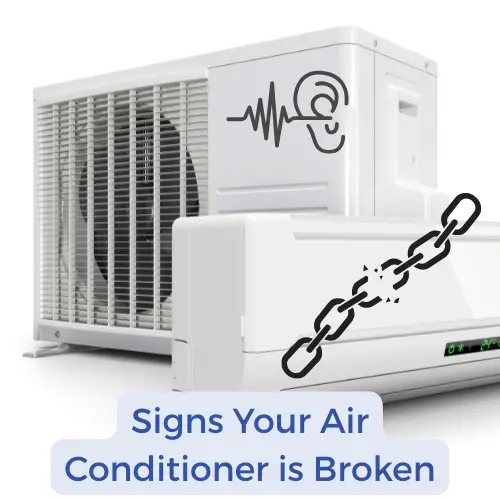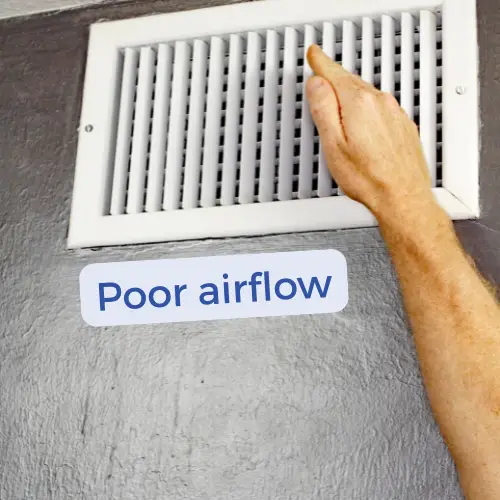As the hot summer days heat up in Englewood, Florida, there's nothing quite as refreshing as walking into a cool, air-conditioned home. But what happens when your air conditioner is broken? A malfunctioning unit can lead to frustrating discomfort, high humidity levels, and rising energy bills.
In this air conditioner troubleshooting guide, we will identify signs of a broken air conditioner, explore common issues homeowners face, and discuss how calling in professional help can save you time and money.

It’s crucial to recognize the warning signs your air conditioner is broken before the situation worsens. Here are a few indicators that can help you determine how to tell if your air conditioner is broken:

Most homeowners want to be proactive rather than reactive when it comes to air conditioning issues. A simple check can help you ascertain the condition of your unit quickly. Here are some DIY steps to help you deduce if your air conditioner is broken:
Understanding common issues can help you avoid inconvenience and costly repairs. Here are some prevalent problems with broken air conditioners:
The compressor is a vital component of your AC system. If it’s compromised, the entire unit may cease to function correctly. Symptoms include unusual noises and insufficient cooling.
Capacitors help start your air conditioner and ensure it runs smoothly. A failing capacitor can lead to a broken air conditioner compressor, resulting in full system failure. Signs include a humming noise, or if you find that the unit doesn’t start at all.
If the fan stops working, the unit cannot effectively circulate air throughout your home. It can lead to overheating and eventual breakdown of the compressor.
Dust and debris can accumulate within your system over time. If your air conditioner is accompanied by dust discharge or reduced airflow, consider having your ducts cleaned or inspected for blockages.

While some small issues can be addressed by the homeowner, many problems with air conditioning units require professional intervention. Here’s why:
Sometimes, waiting for repairs isn’t an option. Here are situations when you should immediately call for air conditioner repair in Englewood, Florida:
As the Florida sun blazes down, a functioning air conditioner isn't just a luxury; it's a necessity for comfort and well-being. This guide has illuminated the key indicators of a malfunctioning AC unit, empowering homeowners in Englewood Florida to recognize potential issues early and take appropriate action. From the telltale sign of no cool air to the subtle nuances of inconsistent cooling or strange noises, understanding these warning signs is the first step in protecting your home from the inconvenience and potential health hazards associated with a broken air conditioner.
We've explored the common culprits behind AC failures, including a broken air conditioner compressor, faulty capacitors, and fan motor issues, along with clogs and blockages that can cripple your system's performance. By recognizing these issues, you can take proactive steps to address them, preventing minor problems from escalating into more significant and costly repairs. While some simple troubleshooting steps, like checking the thermostat, air filter, and power supply, can sometimes resolve minor issues, it’s crucial to know when to seek professional assistance.
That’s where the expertise of certified HVAC technicians becomes invaluable. As the article highlights, attempting DIY repairs on complex systems can be risky and may void any existing warranties. Professional technicians possess the specialized knowledge, tools, and safety protocols necessary to accurately diagnose the root cause of the problem, whether it's a refrigerant leak, compressor failure, or electrical malfunction. They can efficiently and safely address the issue, restoring your system to optimal performance and ensuring your home remains cool and comfortable.
Calling a professional also provides a distinct advantage in terms of long-term cost savings. While the initial investment may seem higher than attempting a DIY fix, a skilled technician can often prevent further damage by addressing the underlying issue promptly. Moreover, they can offer valuable insights into preventive maintenance, helping you optimize your system’s performance, extend its lifespan, and reduce energy consumption, ultimately saving you money on future repairs and utility bills.
Furthermore, the guide emphasizes the importance of immediate action in critical situations. When faced with extended periods of no cooling, concerning smells, or complete system failure, waiting is not an option. Emergency air conditioner repair services are crucial in these instances, ensuring that your home remains a safe and habitable environment, particularly for vulnerable individuals.
In conclusion, maintaining a functional air conditioning system is paramount for comfortable living in Englewood, Florida. By understanding the signs of a broken air conditioner, recognizing common issues, and knowing when to call a professional, you can proactively protect your home, your family's comfort, and your financial investment. When faced with a malfunctioning system, remember that expert assistance is readily available. By partnering with a reputable HVAC service, like Abbott Air, you can ensure your home remains a cool, comfortable sanctuary, ready to withstand the heat of the Florida summers for years to come. Your peace of mind and your family's comfort are well worth the investment in professional air conditioning care.
For more tips and insights into air conditioning maintenance, check our blog at Abbott Air
Disclaimer: The information provided on this website' and blog is for general informational purposes only. All information on the blog is provided in good faith, however, we make no representation or warranty of any kind, express or implied, regarding the accuracy, adequacy, validity, reliability, availability, or completeness of any information on the site. We encourage our readers to conduct their own research and due diligence. The website and its authors are not liable for any errors or omissions in this information nor for the availability of this information. Any action you take upon the information you find on this blog is strictly at your own risk. The content may change over time, and some information may become outdated after the time of publication. We are not responsible for the views, opinions, or accuracy of facts referenced in our articles, as they are meant for informational purposes only.
By sharing we can help family and friends that might need future Air Conditioning Services. We are currently working within Venice, Englewood, North Port and surrounding areas with plans to expand further. Please feel free to share from our social media platforms mentions below.
FACEBOOK:
Come join us on Facebook where we share weekly events and happenings. Stay up-to-date with us on Facebook!

INSTAGRAM:
Our brag rights are all posted to Instagram and we hope you will enjoy the photos and reels shared on here!
